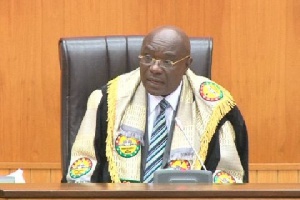 Speaker of Parliament, Edward Doe Adjaho
Speaker of Parliament, Edward Doe Adjaho
Taking into the account the fact that the position of the Chief Justice is highly-skilled and professional, tasked with a huge responsibility to oversee the administration of justice, when juxtaposed with that of the Speaker of Parliament, the former should be placed ahead of the latter in matters of emoluments, a school of thought birthed from the newly-constituted Presidential Committee on Emoluments (PCE), has suggested.
The PCE was inaugurated by President John Dramani Mahama in January this year, to determine the emoluments of Article 71 office holders.
The Committee derives its mandate from Article 71 of the 1992 Constitution which deals with the salaries, allowances, facilities and privileges available to public office holders, including the president and his vice.
Chaired by Professor Dora Francisca Edu- Buandoh, the committee has Professor Kwamena Ahwoi, Dr. William Baah Boateng, Mrs. Norkor Duah and Mrs. Lydia Bawa as members.
The school of thought, while positing that the Chief Justice performs roles which are primarily grounded on the sustenance of the country’s democracy, claimed the current situation, which pins the head of the legislature ahead of that of the third arm of government, is “anomalous and only fenced by the precedence of political authority in the country.”
For other members of the judiciary, this school of thought took into consideration their social exclusion and the bar on them to engage in any profit-making venture, and decided that they should be adequately compensated accordingly.
But a counter group disagreed and further touted that it was wrong for judges to retire on their salaries.
These were some of the views of stakeholders in other parts of the country, which were poured out by the consultant to the PCE, Mr. Napoleon Kpoh, during a consultative meeting with the Coastal Zone organised by the National Commission for Civic Education (NCCE) in Accra yesterday.
Over 50 participants, made up of officials from the public and private sectors, civil society organizations, religious bodies and traditional councils, drawn from the Greater Accra, Volta, Western and Central Regions were in attendance at the ongoing public debate on the appropriate remunerations to be given to Article 71 public office holders.
Article 71 office holders include the President and his Vice, Ministers and Deputy Ministers, Speaker of Parliament and Members of Parliament, Chief Justice, other superior judges and heads of independent state agencies.
According to Mr. Kpoh, who is a trade unionist, two divergent views were expressed when it came to discussions around the executive arm of government.
“One school of thought is that ministers and other political appointees are comfortably living on handsome salaries, privileges and other facilities, without considering the plights of the ordinary citizens,” he pointed out, adding that that explained their reason for saying ministers did not deserve their current package.
On the flip side, he said others also held the view that ministers performed unique roles and “carry out special responsibilities deserving of the emoluments and other conditions of service they enjoy.”
In relation to the legislature, the PCE consultant revealed that some stakeholders were clear on their positions that Members of Parliament did not deserve their emoluments because they mostly concerned themselves with their own emoluments and other personal benefits, without taking into consideration the national economy and the plight of the people they represented.
“Conversely, others argue that by the very nature of the work of the MP, and also burdens on them in terms of school fees, hospital bills, funeral donations etc by their constituents, the emoluments of the MP should be padded to reflect these social responsibilities they carry,” he remarked.
The PCE Chair, who is also the Head of the Faculty of Arts at the University of Cape Coast (UCC) appealed to the participants to think beyond the current crop of indivChief Justice Georgina Theodoraiduals who occupied the positions, as failure to do so would put their expected objective stance in doubt.
“No tribal or ethnic inclinations should have a face here so that we will all be objective,” she explained.
The Greater Accra Regional Minister, Nii Laryea Afotey Agbo, who played host to the participants, urged them to share their views and experiences to enrich the document to be produced and to make it acceptable.
In Kumasi, where the forum was earlier held, part of the suggestion of the participants was the setting up of a provident fund into which Members of Parliament (MPs) would cede part of their monthly salaries to serve as their ex-gratia when they are exiting Parliament.
They said the present remunerations and other benefits being enjoyed by the law-makers was perceived to trigger agitations from other category of public sector workers who felt their huge salaries, was putting undue pressure on the national kitty from, which all public workers were also paid.
Additionally, they said: “the perceived lavish lifestyles of some MPs and their penchant to dole monies to their constituents in the name of social responsibilities, give them an unfair advantage to win the constituent’s parliamentary seats many times over.”